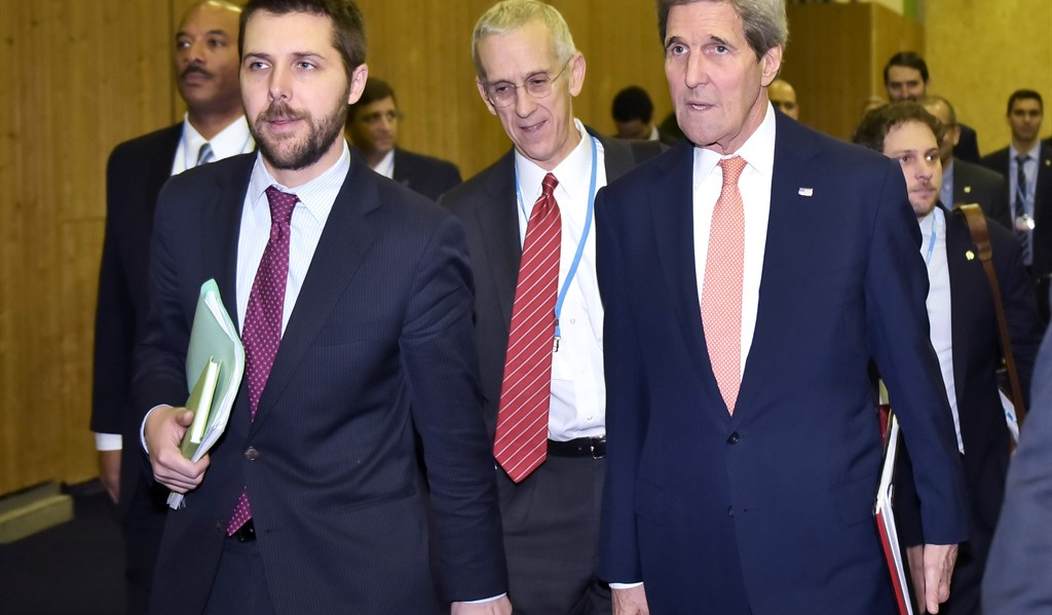It was a busy Sunday morning for National Economic Council Director Brian Deese, as he appeared on NBC's "Meet the Press" as well as CNN's "State of the Union," and ABC's "This Week." The various hosts asked him about concerns with inflation, which last week hit a thirty year high, as Katie covered.
While on "State of the Union," Deese's response on how to curb inflation was to advocate for the $1.75 trillion reconciliation spending bill. He did so with a popular White House talking point, that "this bill is fully paid for" and is "not going to add to inflationary pressures."
As host Jake Tapper pointed out, though, Deese did not address points brought up about an increase in gas and grocery prices.
Deese explained that "we have seen in oil and gas markets is, because of consolidation, we have fewer large companies actually controlling the market," which could lead to "price gouging or market manipulation." As a result, they've "asked the Federal Trade Commission to take a very close look at that right now in the current market conditions."
The White House has repeatedly rejected more drilling options. Further, one of Biden's first executive orders was to kill the Keystone XL Pipeline. Now he has to beg the Organization of the Petroleum Exporting Countries (OPEC) for more oil.
Tapper pointed out Americans' have a particularly disastrous view of the job Biden is doing on the economy, according to the latest poll from The Washington Post/ABC News. Deese's answer was to refer to more White House talking points, which included advocating for the $1.2 trillion infrastructure bill that passed earlier this month and reminding people about the pandemic.
Recommended
.@jaketapper: "Do you think that you and the President were wrong and inflation is not a short-term...issue?"
— State of the Union (@CNNSotu) November 14, 2021
National Economic Council Director Brian Deese: "No, I don't think so...What we have said consistently is that the pandemic and the economy are interlinked." #CNNSOTU pic.twitter.com/BuQXBR2ULq
Deese stuck to how "the pandemic and the economy are interlinked" and that "we're seeing these price increases in inflation globally because of the supply chain challenges associated with COVID."
Tapper even called him out on how the White House has failed to listen to the warnings from economist Larry Summers, a fellow Democrat who held Deese's role in the Obama administration.
"Is it possible that Americans are suffering now from high prices because the Biden administration overstimulated the economy with all of this money going into the economy," Tapper asked, as he brought up Summers' warnings that the $1.9 trillion American Rescue Plan was a major cause for inflation and "the least responsible macroeconomic policy we have had in the last 40 years."
Deese answered "well, no, that's not our perspective," and claimed inflation will go down next year.
While on "Meet the Press," Deese acknowledged that "there's no doubt inflation is high right now," but went on to sing the praises of the Biden administration's handling of the economy. Meanwhile, Biden is faring poorly not just in the poll mentioned above, but in multiple polls. According to RealClearPolitics (RCP), for data from October 16-November 10, Biden has a 38.6 percent approval rating on the economy and a 54.4 disapproval rating.
Host Chuck Todd mentioned "we have an economic recovery, but inflation is now outstripping the wage gains. As you can see here, year over year, wages are up nearly 5 percent, but the inflation basically eats all of it, and then some."
While Deese wanted to focus on topics like childcare, and why the spending bill will fix the problems, Todd wasn't having it. "None of that is going to impact inflation right now," Todd pointed out when Deese kept bringing up the supposed benefits of the bill. Todd would have preferred to talk about the labor shortage, such as with truck drivers. It went unmentioned though that a worsening factor for these labor shortages has to do with vaccine mandates the Biden administration is fighting to enforce.
During "This Week," the first response out of Deese's mouth was to advocate for the spending bill, using the same language as he did earlier. This included once more pointing out that the bill is "fully paid for," with Deese also offering that because of this "it doesn't add aggregate demands to the economy."
Deese even claimed that "frankly, it’s been some time in Washington since we’ve done something that’s fiscally responsible."
The bill has not yet been scored by the Congressional Budget Office (CBO), as host George Stephanopoulos pointed out, which is why it did not receive a vote in the House last week alongside the infrastructure bill.
Pressed by @GStephanopoulos what Biden admin can do in the short term to address inflation, National Economic Council director Brian Deese says “we have to finish job on COVID.”
— This Week (@ThisWeekABC) November 14, 2021
“The second thing we can do right now is focus on the supply chain issues.” https://t.co/n5uk5SaxMd pic.twitter.com/n4uNL1J8zu
Stephanopoulos also asked that, even if Deese is correct on this point, how the administration is going to deal with the effects of inflation in the short term. Deese's answer once more entailed how "we have to finish the job on COVID," which involves getting more people vaccinated, including children ages 5 to 11 years old, for whom the Pfizer vaccine was just recently approved.
The host pointed out that Sens. John Barrasso (R-WY) and Joe Manchin (D-WV) have also expressed concerns that the spending bill will make inflation worse, but Deese continued to claim the bill is fully paid for.
Another likely reason the administration is desperate to get the reconciliation spending as a major part of Biden's agenda is for that boost in the polls Biden is so desperate for. Even with the passage of infrastructure, as Spencer and I covered, the boost hasn't appeared yet.
























Join the conversation as a VIP Member